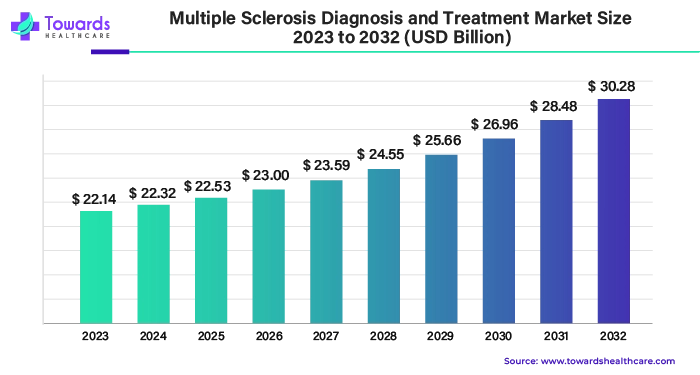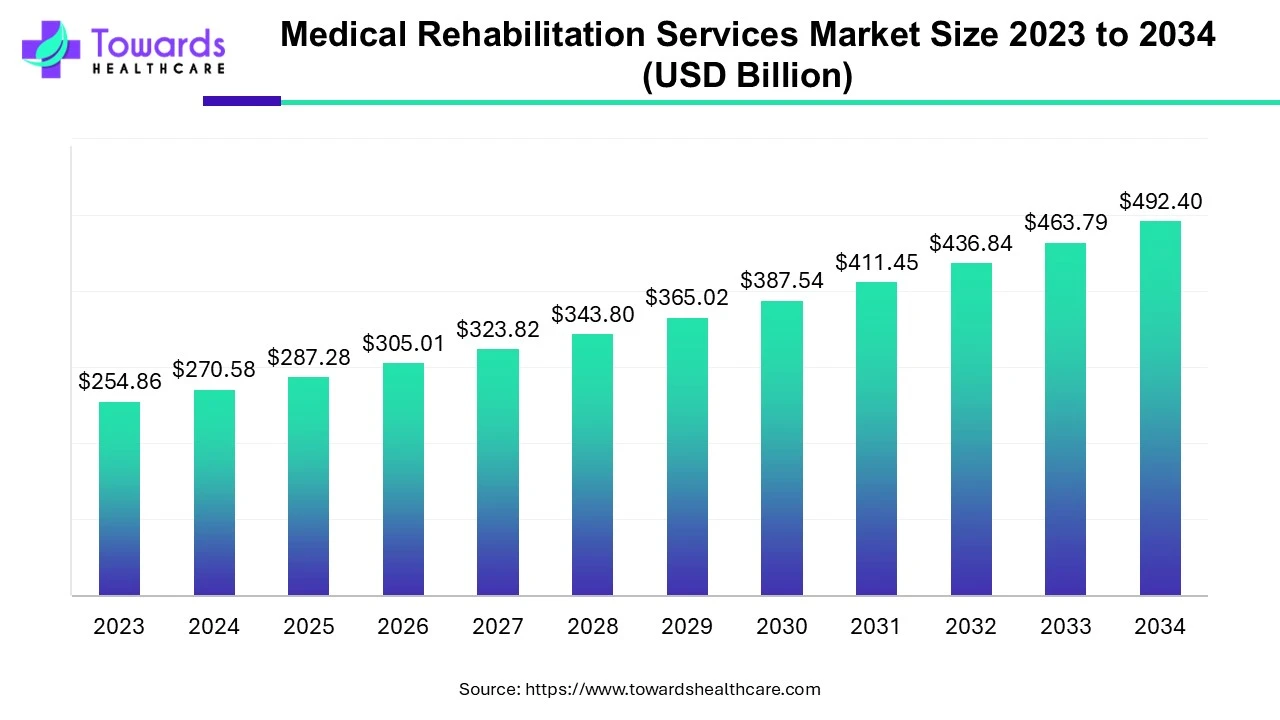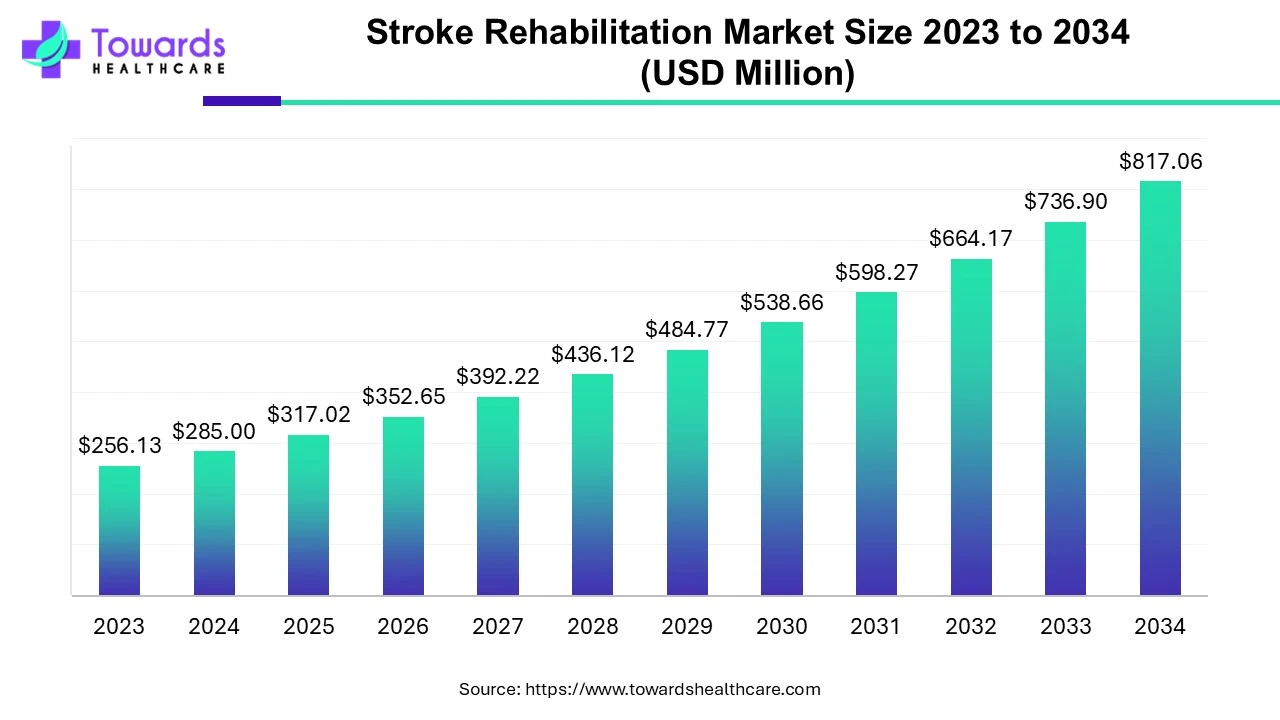
The multiple sclerosis diagnosis and treatment market size is projected to expand significantly, reaching approximately USD 30.28 billion by 2032 from USD 22.14 billion in 2023, with a compound annual growth rate (CAGR) of 3.4% between 2024 and 2032.
Key highlights from the report include:
- The pivotal role of technological advancements in the management of multiple sclerosis.
- Analysis of the distribution of the economic burden associated with multiple sclerosis.
- The importance of early disease diagnosis in facilitating better prevention strategies.
- Revenue breakdown of multiple sclerosis-related products among different market participants.
- Relapse-Remitting MS (RRMS) accounting for over 70% of the market share in 2023.
- Medications commanding a significant 81% market share in 2023.
- The Asia Pacific region anticipated to witness the fastest growth with a 7.0% CAGR over the forecast period.
Download a sample of this report @ https://www.towardshealthcare.com/personalized-scope/5140
In February 2024, Multiple Sclerosis Australia granted 17 new research awards totaling over $4.5 million for various projects across the country, supporting studies and fellowships ranging from one to five years, all focused on essential areas of MS research.
Multiple sclerosis is a common neurological disease typically affecting individuals aged between 20 and 40. It occurs when immune system cells, which normally protect against pathogens, attack the central nervous system cells, particularly the myelin sheath surrounding nerve fibers.
The disease manifests differently in individuals, ranging from mild cases with minimal disability to progressive deterioration leading to increased disability over time. Most MS patients experience periods of symptoms followed by periods of relative dormancy, with partial or complete recovery. While MS is rarely fatal, it can significantly impact quality of life.
The three main types of multiple sclerosis based on symptom progression are:
- Relapsing-remitting Multiple Sclerosis (RRMS): Characterized by alternating periods of symptom exacerbation and remission, this is the most common type.
- Secondary-progressive Multiple Sclerosis (SPMS): Symptoms worsen gradually over time following an initial relapsing course.
- Primary-progressive Multiple Sclerosis (PPMS): Symptoms worsen steadily from onset without distinct remission periods.
Increased research funding and supportive legislation have contributed to the market’s growth, exemplified by initiatives such as the National Multiple Sclerosis Society’s allocation of USD 4 million towards new research projects in November 2023, as part of their annual commitment exceeding USD 30 million across global MS research endeavors.
For instance, in June 2022, Bristol Myers Squibb released additional analyses of the Zeposis Phase 3 DAYBREAK open-label extension and SUNBEAM trials, demonstrating cognitive benefits associated with early Zeposia use for relapsing MS patients.
Early diagnosis techniques play a crucial role in timely MS management. Methods such as Magnetic Resonance Imaging (MRI), cerebrospinal fluid analysis, and neurological assessments enable early detection when symptoms are mild or absent. This facilitates prompt treatment initiation, improving patient outcomes and driving demand for therapeutic interventions and symptom management strategies. As awareness grows and treatment options advance, more individuals seek medical care upon MS diagnosis, underscoring the importance of early detection in enhancing quality of life for those living with MS.
Regional Disparities in Multiple Sclerosis Diagnosis and Treatment
In North America, patients benefit from advanced diagnostic tools and diverse treatment options for multiple sclerosis (MS). However, challenges persist, particularly in remote or rural areas where healthcare infrastructure requires enhancement. Access to specialized care and treatments remains a hurdle for individuals in these regions. Despite robust research and development efforts in MS diagnosis and therapy, there are lingering disparities in access and affordability that demand attention to achieve equitable care.
Conversely, the landscape for MS diagnosis and treatment in the Asia-Pacific region exhibits significant variation. While some countries boast well-established healthcare systems with access to cutting-edge diagnostic tools and specialized therapies, others grapple with limited healthcare infrastructure, resulting in hurdles in accessing MS diagnosis and treatment options. Notably, countries like Japan, Australia, and Singapore demonstrate advanced healthcare facilities and expertise in MS management, offering comprehensive services, including access to disease-modifying therapies.
Addressing these challenges necessitates collaborative initiatives involving governments, healthcare providers, patient advocacy groups, and international organizations. Such efforts are pivotal for bridging the gaps in MS care and ensuring equitable access across the region.
Multiple Sclerosis Diagnosis and Treatment Market Segments
By Type
- Clinically Isolated Syndrome (CIS)
- Relapse-Remitting MS (RRMS)
- Primary Progressive MS (PPMS)
- Secondary Progressive MS (SPMS)
By Diagnosis
- Imaging Tests
- Spinal Fluid Analysis
- Other Tests
By Treatment
- Medications
- Injectables
- Beta Interferons
- Glatiramer Acetate
- Oral Medications
- Fingolimod
- Dimethyl Fumarate
- Teriflunomide
- Cladribine
- Diroximel Fumarate
- Siponimod Tablets
- Infusion Treatments
- Natalizumab
- Ocrelizumab
- Alemtuzumab
- Mitoxantrone
- Injectables
- Physical, Occupational or Speech Therapy
- Mental Health Counselling
By Geography
- North America
- Europe
- Asia Pacific
- Middle East and Africa
- South America
To own our research study instantly, Click here @ https://www.towardshealthcare.com/price/5140
Read more about Multiple Sclerosis Diagnosis and Treatment Market:
- Multiple Sclerosis Diagnosis and Treatment Market Trends
- Multiple Sclerosis Diagnosis and Treatment Market Companies
You can place an order or ask any questions, please feel free to contact us at sales@towardshealthcare.com
About Us
Healthcare Web Wire is a premier subsidiary of Towards Healthcare, dedicated to providing comprehensive insights and information related to the healthcare industry. With a commitment to delivering accurate and timely updates, Healthcare Web Wire serves as a vital resource for professionals, enthusiasts, and stakeholders within the healthcare sector. Our platform serves as a central hub for the latest news, trends and developments shaping the healthcare landscape. Join us on Healthcare Web Wire and become part of a vibrant community dedicated to advancing healthcare knowledge and shaping the future of healthcare worldwide.
Explore the comprehensive statistics and insights on healthcare industry data and its associated segmentation: Get a Subscription
For Latest Update Follow Us: https://www.linkedin.com/company/towards-healthcare


